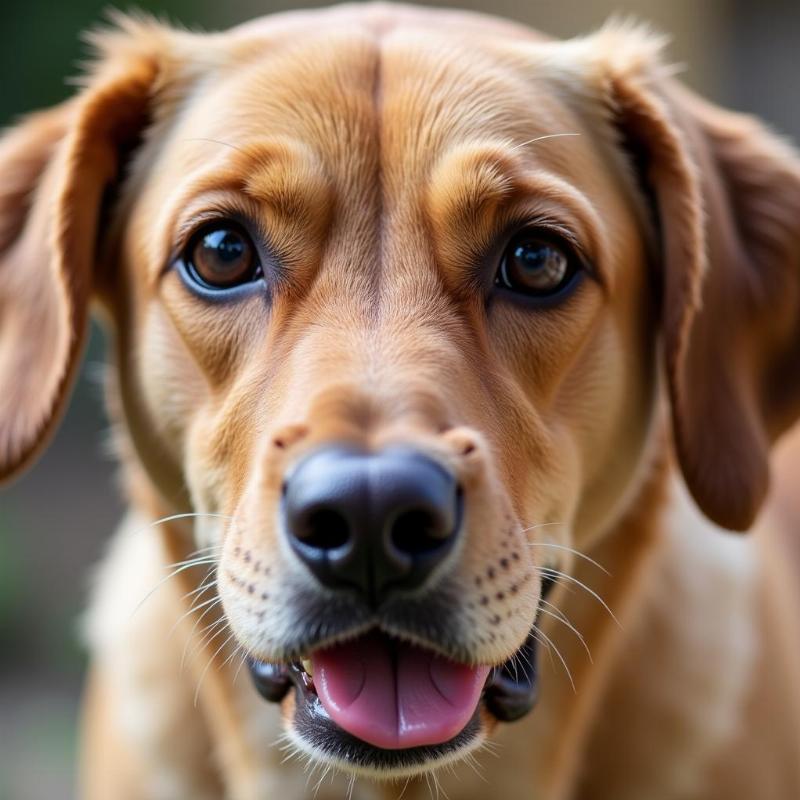Dog urine, while a common and often unavoidable part of pet ownership, can create more than just an unpleasant odor. Many pet owners wonder, can dog urine cause mold? The answer is yes, it can contribute to mold growth under specific conditions. This article will explore the connection between dog urine and mold, the potential health risks, and how to prevent and address this issue effectively.
Understanding the Link Between Dog Urine and Mold
Dog urine contains urea, a nitrogen-rich compound. When urine soaks into porous materials like carpets, wood, or drywall, the urea breaks down and releases ammonia. This ammonia, combined with the moisture from the urine, creates a perfect environment for mold spores to thrive. Mold thrives in damp, dark environments, and urine-soaked areas often provide just that. Think about areas where your dog might frequently have accidents – corners, behind furniture, or under rugs. These spots can be breeding grounds for mold if not cleaned and dried promptly.
Health Risks of Mold Exposure for Dogs and Humans
Both dogs and humans can experience health problems due to mold exposure. For dogs, symptoms can include respiratory issues like coughing, sneezing, and wheezing. Some dogs might also develop skin irritations or allergic reactions.  Các triệu chứng dị ứng nấm mốc ở chó In humans, mold exposure can trigger similar respiratory problems, as well as headaches, eye irritation, and even more severe reactions in individuals with compromised immune systems. It’s crucial to address mold growth quickly to protect the health of everyone in your household.
Các triệu chứng dị ứng nấm mốc ở chó In humans, mold exposure can trigger similar respiratory problems, as well as headaches, eye irritation, and even more severe reactions in individuals with compromised immune systems. It’s crucial to address mold growth quickly to protect the health of everyone in your household.
Preventing Mold Growth from Dog Urine
Preventing mold growth from dog urine involves a two-pronged approach: prompt cleaning and moisture control. First, address accidents as soon as they happen. Blot up as much urine as possible with paper towels or a clean cloth. how to remove dog smell from carpet Then, use an enzymatic cleaner specifically designed for pet urine. These cleaners break down the urea, eliminating the food source for mold. Avoid using ammonia-based cleaners, as the ammonia can actually exacerbate the problem. hay vs straw for dog bedding Secondly, ensure good ventilation in areas prone to accidents. Open windows, use fans, or run a dehumidifier to reduce moisture levels. Regularly cleaning and vacuuming carpets and rugs can also help prevent mold spores from taking hold. If your dog has frequent accidents, consider using waterproof pet pads or washable bedding in designated areas.
Dealing with Existing Mold from Dog Urine
If you’ve already discovered mold growth due to dog urine, it’s important to act quickly. For small areas on hard surfaces, you can usually clean the mold yourself using a solution of bleach and water (one part bleach to ten parts water). However, always wear protective gear like gloves and a mask when cleaning mold. what foods can cause seizures in dogsdog peed on couch cushion For larger areas or mold growth on porous materials like carpets or drywall, it’s best to contact a professional mold remediation service. They have the expertise and equipment to safely and effectively remove the mold and prevent its return.
Conclusion
Dog urine can indeed cause mold, posing health risks to both pets and people. By understanding the connection, taking preventative measures, and addressing existing mold promptly, you can maintain a healthy and mold-free home for you and your furry companion. Don’t underestimate the importance of prompt cleaning and moisture control in preventing this issue.
FAQ
- How can I tell if a spot is mold or just a stain? Mold often appears as fuzzy or discolored patches, and it may have a musty odor.
- What type of cleaner should I use for dog urine? Enzymatic cleaners are most effective in breaking down the urine components that contribute to mold growth.
- Can I use bleach to clean mold on carpet? While bleach can kill mold, it can also damage and discolor carpet. It’s best to consult a professional for mold on porous materials.
- Is black mold always dangerous? While not all black mold is toxic, any type of mold growth should be addressed promptly due to potential health risks.
- How often should I clean my dog’s bedding to prevent mold? Wash your dog’s bedding at least weekly, especially if they’ve had accidents.
- My dog keeps urinating in the same spot. What can I do? Consult with a veterinarian or professional dog trainer to address underlying behavioral issues.
- Can mold from dog urine affect my dog’s health? Yes, mold exposure can cause respiratory problems, skin irritation, and other health issues in dogs.
symptoms of mold poisoning in dogs
Beautdogs.us is your premier destination for dog lifestyle advice and resources in the US. We provide expert guidance on dog breeds, care, and product recommendations, catering to both novice and experienced dog owners. From understanding how to remove stubborn odors to choosing the right bedding for your furry friend, Beautdogs.us is your trusted source for comprehensive canine information. Contact us today for personalized support! Email: [email protected], Phone: +1 501-555-7529.